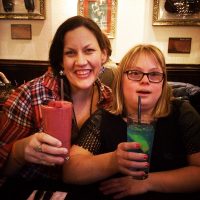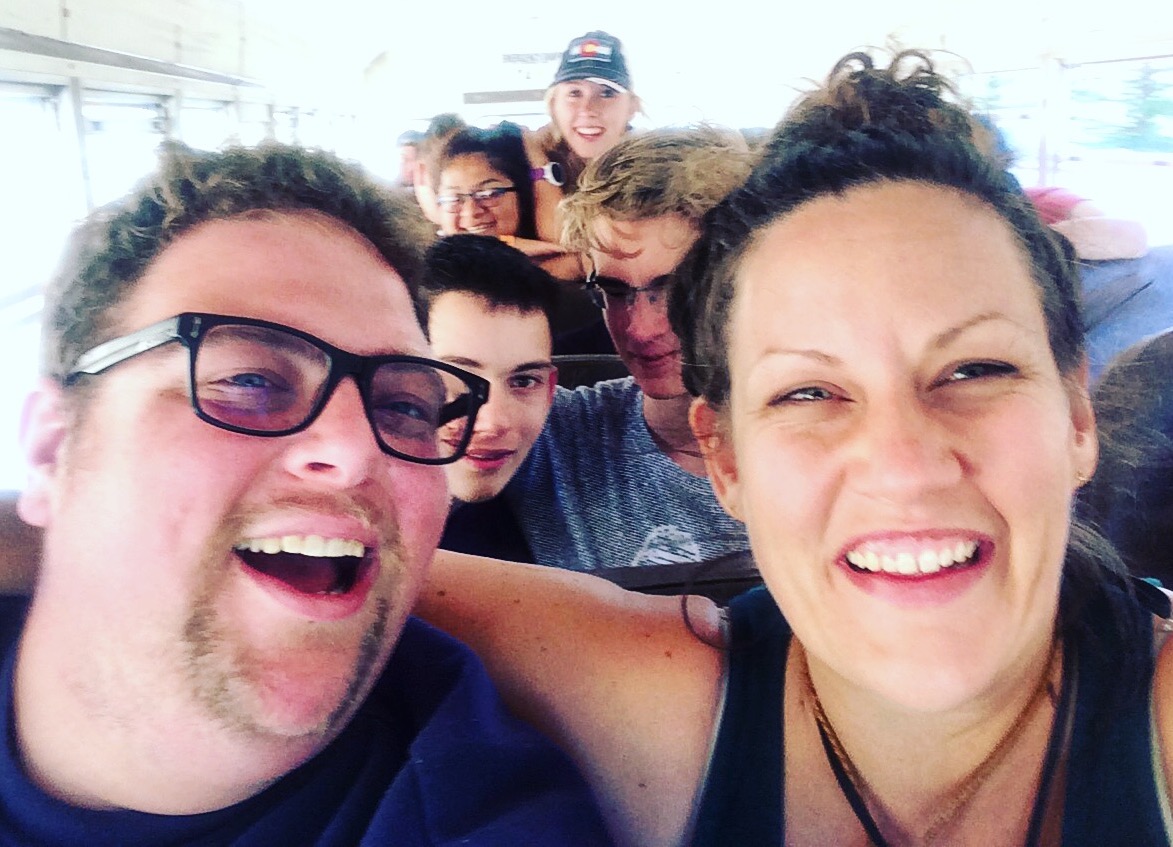Welcome to our Changemaker Profiles blog series! Each edition we profile one outstanding social changemaker from the JVA client community. By sharing the stories of some of the incredible people we get to work with every day, each accomplishing extraordinary work in nonprofits, government, social enterprise and elsewhere, we hope we will bring a little light and inspiration to your day!
For this edition, we spoke with Andrea Moore, executive director and co-founder of The Wayfaring Band. The Wayfaring Band offers leadership and life skills training through travel, serving adults with and without cognitive and developmental disabilities.
1. Tell us about your organization and the social change you are trying to achieve.
“First, I always want to make sure people understand that we are not a rock-n-roll or musical band. We are a band of travelers, and we offer road trips and far-flung adventures for adults with and without intellectual and developmental disabilities. While we travel, we learn and then practice leadership and life skills so we can all get better at accepting each other just the way we are.
“Culturally, we are living in a time when it’s still a new idea that adults with intellectual and developmental disabilities (I/DD) might have the tools to make their own decisions. Change has been moving at an extremely rapid pace in our field: It was only maybe two generations ago that the standard in our culture was for all adults with developmental disabilities to be institutionalized. During the last generation, it became more common for people to remain at home, integrated as a member of their family, and the big push over the past 40 years has been in support of special education, day programs for socialization, and policy and advocacy groups.
“Now, people with I/DD and their allies are advocating for full community inclusion— which means equitable, accessible opportunities for housing, employment, socialization, recreation, and more. And to many people, it’s still an utterly radical idea that people with I/DD have dreams, preferences and opinions—and capacities that exceed all the boxes they’ve been stuck into. So we have a lot of work to do!”
“In The Wayfaring Band community, our approach to effecting change is twofold. On the one hand, we create opportunities for adults with disabilities to have agency over their own choices and to fully participate in the world as an adult, with the support of trained staff members. But we also train people without disabilities to have more inclusive practices and to build more inclusive systems. Our dream is that by modeling our vision of inclusion everywhere we travel, we can fundamentally alter the way people experience difference.”
2. What keeps you inspired and going when things get tough?
“I am very community-driven. So when it seems like the momentum for change is grinding to a halt, or if I am trying to navigate a crisis or day-to-day difficulty, I find myself leaning on my teammates, our travelers, other leaders in social justice, and my close friends. And honestly, it also helps when I hear from those folks that life and work and social change are also hard for them. It humbles me to remember that the challenges I’m facing are not unique or special. It reminds me that everyone is working hard in their own sphere… That’s just life, and it’s OK that it’s hard. It doesn’t mean we’re doing anything wrong; it doesn’t mean we need to change our tactics.”
3. What advice would you give to someone who is trying to break new ground in a traditional field?
“First, do your research. Most good ideas have already been had in some way or another by other smart people. It may be that there are bright, passionate people working on a challenge and trying to break the same or similar ground as you. Collaborating or partnering with those people may not be your ultimate desire, but it’s good to do the research so you can decide if that’s the right course of action before reinventing the wheel.
It may be that there are bright, passionate people working on a challenge and trying to break the same or similar ground as you. Collaborating or partnering with those people may not be your ultimate desire, but it’s good to do the research so you can decide if that’s the right course of action before reinventing the wheel.
“Ask yourself, ‘Is my perspective and approach truly new and necessary? Or would it be more effective for me to partner with someone or lend my support to an existing effort?’ I find it really frustrating when people come in swinging without having taken the time to research and understand the full landscape. That savior mentality does more damage than good.”
4. What book do you recommend to everyone you meet and why? OR What book is on your to-read list and why?
“One book I find myself referencing a lot is Jim Collins’ ‘From Good to Great and the Social Sectors.’ One major takeaway that I come back to again and again is that in our sector it is critical to examine who is on the bus, rather than where it is going. Our most important type of currency is not capital but relationships, because we’re talking about social change, which is people. So without a deep understanding of people and human needs, we’re stuck before we start.
“Another book that changed how I think, from outside the sector, is ‘Setting the Table: The Transforming Power of Hospitality in Business,’ by Danny Meyer. He is a restaurateur with several successful restaurants in New York City and elsewhere. Instead of the model where the investor comes first—the traditional business model—he reverses that, prioritizing the wellbeing of employees first and foremost. So if your team is functional and happy, it trickles down to customers, investors and other stakeholders. We take that to heart at The Wayfaring Band: Hospitality is how we practice our core value of inclusion. And that process begins with our own team, within our own organization.
“Thinking about cultures of shared leadership—of spreading power across a whole team instead of centralizing it in one person—reminds me of a trend that is really popular right now that I find disheartening and disturbing. I’ve been seeing a lot of social media posts, articles, even little knick-knacks in shops, promoting the idea of the “boss bitch.” She runs the whole show with charm and panache, but she’s not afraid to make tough decisions without apology.
“She manages her home, including her kids/husband/dog/garden, as well as a whole team of employees… who all fail to impress her on a regular basis. She’s got a coffee in one hand and a glass of wine in the other, and her tousled hair falls just so in the selfies she posts on social media alongside her thoughts about how hard it is to be a leader but how rewarding her journey is. Oh, the life of a world-weary entrepreneur! …
“As a woman in leadership, I get what’s attractive about the boss bitch persona. There’s something satisfying about the myth of one woman against the world. But for me, I find it in poor taste. And contrary to how the persona gets spun, I also don’t think it’s feminist. It reminds me of a vintage ad that I tore out of an old National Geographic magazine years ago: Being ‘bright, resourceful, alert, cool, collected, sociable, reliable, bubbly, confident and pretty’ still only gives you ‘one chance in 25 of becoming a Delta Airlines stewardess.’ I can’t meet the standard of being that perfect woman on my best day… especially if that still isn’t actually good enough!
“At its core, I find the idea of the boss bitch to be paternalistic. I’m more interested in leadership models that promote witnessing, listening, connecting and partnering… a concept I learned from the book “Global Citizens: How our Vision of the World is Outdated, and What We Can Do about It,” by Mark Gerzon. I think it takes all of us to achieve the kind of change we really need, and one person working really, really hard isn’t going to get it done.”
5. How have you worked with JVA, and how has that helped your organization?
“JVA has been on my radar for years. I attended a board development workshop offered by JVA about twelve years ago, before I was running a nonprofit myself. The workshop was really relevant and gave me great tools, so when I co-founded our current organization and started recognizing some of my education and experience gaps, JVA was the first place I looked. I attended the Executive Director Academy and also the Development Intensive along with our program director. Our organization is small with only two full-time employees, so we spread the responsibility for fundraising across the whole organization. One thing we like about JVA is that it is personalized and very practical: we know we can go in and come out with immediately applicable skills. And we feel like it’s very affordable considering the value of the content.”
6. What else would you want to share with us that we haven’t asked?
“In the nonprofit sector, I think we are too comfortable allowing the rest of the world to categorize us as underpaid, overworked, and underappreciated. We are too willing to let that narrative stand. We worry that our attempts to treat our own employees with the same dignity we show our consumers will be viewed as frivolous and a diversion of valuable resources.
“But our value begins and ends with our own internal culture. As a leader in the nonprofit sector, it’s up to me to make sure that the internal policies and procedures of the organization I manage don’t perpetuate old narratives based in lack and competition for resources. A shift of narrative, a shift of culture in the social sector, is needed. And it won’t be driven by donors, consumers or other stakeholders. We are the leaders; we are the ones who must make that happen.”
Keep up with the area’s most inspiring changemakers—read JVA’s Changemakers blog!







Leave A Comment